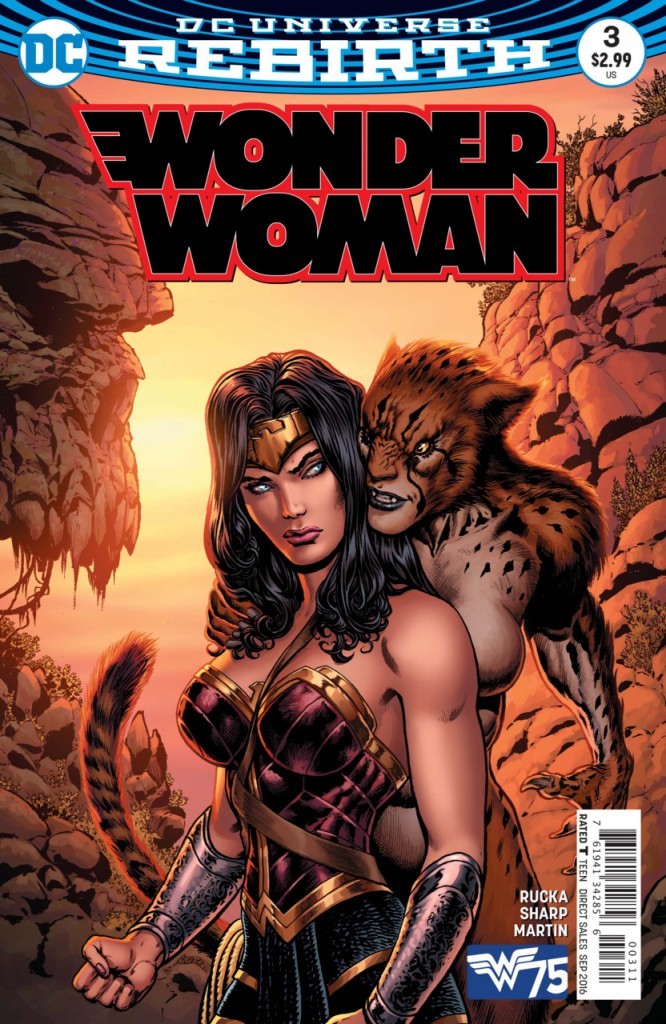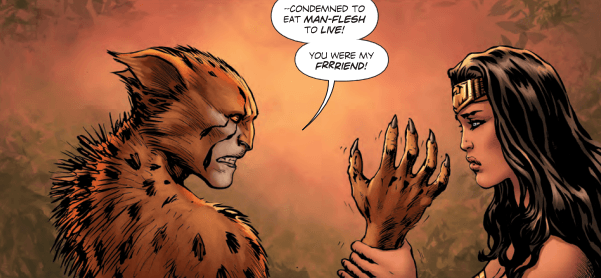Writer: Greg Rucka / Artist: Liam Sharp / DC Comics
What can be said about supervillain Cheetah? Ruthless, cunning, proud, perhaps a dash of Eartha Kitt’s Catwoman for good measure, Cheetah’s relentlessly violent nature has served for decades as the struggle between the warrior and the pacifist in Wonder Woman, the temptation to forego the efficiency of savagery for grace. In some places you could argue that the dynamic has become almost too predictable. But of course, as Greg Rucka informed us in an interview at the beginning of the comic’s arc, “You think you know Barbara Minerva, the Cheetah? […] you’re just flat-out wrong.”
At first glance Rucka’s Cheetah already stands out in her significantly more bestial design, an even more feral invocation of her nature than perhaps her closest counterpart in the DCAU. There are no hot pants, crop tops, or luscious flowing hair to distract the reader from the horrific reality of Barbara’s curse at the hands of a brutal and unforgiving god. I’ll admit it, I wasn’t quite confident in the series switching artists so frequently, but just as surely as Scott’s art was the lynchpin for the previous issue’s tender atmosphere, so too are Sharp’s lines necessary to revealing Cheetah for who she really is. More than ever we’re able to see how much she is so achingly everything Diana is not: vicious where Diana is gentle, erratic where Diana is calculated, beastly where Diana is beautiful. Rucka is correct. Picking up this comic, I thought I knew who Cheetah was. Having read it, however, I have become certain that I have been her, and sometimes am her still.
I’ve already written about some of my personal history with abuse, so I won’t go into details here, but as someone who has literally written a poem in the persona of Harley Quinn I can say that Cheetah feels like one of the most relatable survivor characters I’ve read. Different survivors have different experiences, so I am in no way dismissing Harley’s, but for me one of the most challenging aspects of her character historically was watching how much of her pushing back at the Joker’s mistreatment is either cast as comic relief or quickly absorbed by a frenzy of blissful denial and goofy antics. Barbara, on the other hand, embodies the ugly ferocity of fighting the corruption of emotional scars to the point of bitter self-destruction. Like many survivors, she is haunted and hunted by the bloodthirsty “followers” of her abuser, though here instead of thoughts they are manifested into physical monsters. So often artistic portrayals tell us “real” survivors are passive, wilted victims, not the woman so wild with agony that she will cling to agency wherever she can find it.
Equally crucial, however, is the response that Rucka writes for Wonder Woman. Rather than self-righteously berate Barbara for her animalistic nature or take on the mantle of some savior complex, Diana insists on bringing herself as close to her friend’s pain as possible. To be Wonder Woman is to elevate compassion to the height of a superpower, to exist as a being for whom humanity and love will always be essential to her definition of justice, especially as someone who continuously advocates for women. I remain amazed at how consistently this comics marries a grand mythos with our most intimate of human experiences and can only hope that the emotional focus grows even sharper with the next issue.
Are you following Black Nerd Problems on Twitter, Facebook, Tumblr or Google+?





Show Comments
Julia
This is brilliant and devastating, from the insight in the article to the re-characterisation of the Cheetah: pain where you want to rip throats, taste blood, eat hearts, scream…a “woman so wild with agony that she will cling to agency wherever she can find it.” Yeah.
Thanks again for all the words: I don’t have much right now.
“Having read it, however, I have become certain that I have been her, and sometimes am her still.”